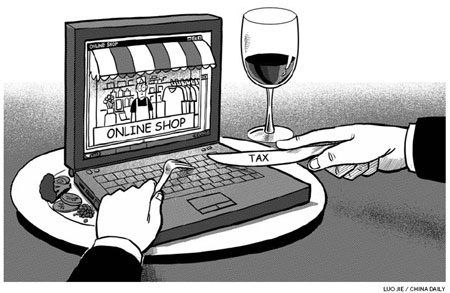Op-Ed Contributors
Debate: e-commerce
Updated: 2011-08-29 07:58
By Wang Jun, Teng Xiangzhi (China Daily)
Should online businesses be taxed? Two experts come up with two opposing views.
Not the right time to tax online business
Wuhan city officials are reported to have collected more than 4.3 million yuan ($665,000) in tax from a company that sells clothes online. This has left online store owners wondering whether online businesses are now taxable. In the long term, online commerce should follow the principles of the market but imposing tax on online businesses now could lower their overall efficiency and reduce people's motivation to start an online business. Therefore, the government should plan taxation cautiously.
Collecting sales tax from online vendors may prompt people to return or stick to traditional shopping, which will increase transaction costs. Thanks to the impact of information technology, especially the Internet, many people have gradually accepted online shopping. As the habit of walking into real stores to buy something changes, even some ordinary Chinese people have begun buying online.
Take taobao for example. It is China's largest online transaction platform. In 2010, its transactions reached 30 billion yuan ($4.69 billion). And the rate has been increasing, according to latest studies. An important reason why Chinese residents are willing to buy online is the low transaction cost. Also, by buying online consumers can save time.
Online transactions have become part of many consumers' daily life. Data from taobao shows online transactions soared rapidly in recent years. This is because many companies, including some well-known brands, deliver their products directly from factories to customers, which cuts out the costs of middlemen and thus prices.
But once tax is imposed on online sales, prices of products will rise because online stores will pass on the tax burden to buyers. As a result, price-sensitive buyers will buy fewer products or stop buying online altogether.
Daily necessities comprise the largest part of online purchases. According to taobao data, in the first half of last year, the total sales of daily necessities was more than double that of 2009 and rose from being the fourth largest component to first. Every minute on average, 438 daily necessity items are sold on taobao. So taxation will have the greatest impact on online shoppers, most of whom are middle- or low-income people.
Besides, imposing tax will increase the barriers for online businesses, and thus discourage potential businesses. Most of the online transactions are between ordinary netizens because the majority of those doing business on the Internet are small private businesses. Taobao holds about 80 percent of the online market share. By the end of 2010, the website had nearly 370 million registered users, most of the shopkeepers focusing on consumer-to-consumer transactions. The shopkeepers do not necessarily need business licenses and carry on business on the basis of only their identity cards, relevant personal information and bank accounts. The minimal requirement is ideal for many Chinese to create their own working environment and realize their dreams. And to some extent, it increases the employment rate in cities.
But once the government imposes tax on Internet transactions without any deductions or exemptions, it will become difficult for many online businesses to survive. And many local governments do not want online commerce to become the realm of the wealthy.
Furthermore, even if the government imposes tax, the immature tax collecting system will make it almost impossible for it to gather proper information on taxable online businesses, let alone network transactions. Before imposing any tax, the government has to build a foolproof system to monitor every online business and capital flow, which demands huge costs.
China Internet Network Information Center figures show that in 2010, the number of online buyers doubled from the previous year, which means they are increasing three times faster than the number of netizens. Taxpayers and the tax department both want to see a reduction in taxation costs. But the credit system in the country is far from perfect, plagued as it is by low levels of financial transactions and tax consciousness. Hence, the government should think twice before imposing tax on online business, because it is related not only to the long-term stability of the taxation system, but also to economic growth, people's lives and social stability.
The author is deputy director of the Institute of Public Finance and Tax Revenue in the Central University of Finance and Economics.

There's no reason not to tax e-commerce
E-commerce is a commercial activity that uses the Internet as the transaction platform. According to China's tax law, people and businesses need to pay income tax, value-added tax and/or corporate tax if they sell goods, software and/or pictures or act as information consultants on the Internet.
Since e-commerce can be transnational, the tax law could face some tough problems. The first problem is erosion of the tax base. If buyers and sellers are based in different countries and if Customs duty and tax is not imposed on products flowing across national borders, a sovereign state could suffer the loss of tariff and value-added tax.
Second, it is hard to determine the nature of online trade and the income of online businesses. For example, since videos, pictures and books can be downloaded by customers, it is difficult to determine whether tax should be imposed on the profit disclosures or real sales.
And third, it is difficult to track the four elements - tax registration, account books, tax declarations and tax checks - on which tax collection and management is based when it comes to online businesses.
To deal with the three problems, some experts have suggested setting a new type of tax for e-commerce. For example, Australia which imports technology, products and services through the Internet on a large scale has devised a special tax policy for e-commerce based on income disclosure to prevent loss of tax. In the United Sates, the Internal Revenue Service has set rules for Internet trade, dividing the trade of copyright and transaction of products that involve copyright. These rules are good examples for China to learn from and set its own regulations.
From the legal point of view, although China's tax management and collection method are not mature enough to deal with online businesses, it does not necessarily mean tax cannot and should not be imposed on e-commerce.
The Wuhan tax bureau, for example, recently levied tax on a company's online transactions to apply the current added-value tax rules to e-commerce without changing or violating the tax law. There is thus no need for the National People's Congress (NPC) Standing Committee to start working on legislation aimed especially at e-commerce. Tax authorities can identify the constituent elements of the tax law, interpret them, and issue regulations and the taxation mechanism for e-commerce.
In fact, in terms of examining online transactions and revenues of businesses, the tax authorities and tax practitioners have a natural advantage. Given that the revenue and tax authorities know the ins and outs of the tax law, they should not find it difficult to use them for imposing tax on e-commerce. Besides, they can use their judgment and specific provisions to decide which online businesses should be taxed because it is not difficult for them to collect the required data.
According to China's long-standing practice, ministries issue laws, even though NPC Standing Committee drafts and fine-tunes them. But that does not mean new legislation is needed to improve the implementation of the tax law.
Because of "weak auditing" and dependence on voluntary income disclosure, the tax collection in China is at best "passive". But despite not being ready for e-commerce or another tax reform (such as personal income tax reform), the current tax collection system is not ineffective.
Essentially, there is no difference between e-commerce and traditional business in goods and services, except their forms of transaction. All business transactions include a contract, and exchange of goods or services and money. The e-transactions of an individual or company can be traced through online operation facilitators, electronic payments, cargo transfers, and therefore can also be taxed.
Taxpayers are individual or legal entities with business or tax registration or with business and tax registration that do report their online transactions, or industrial and commercial establishments with business registration.
To identify taxpayers, including those doing business online, the tax authorities can fall back upon the Law of the People's Republic of China on the Administration of Tax Collection, innovate methods of tax collection and management, and order e-commerce businesses to fulfill their obligations of paying tax according to law.
Any journey, even the longest and most arduous one, begins with the first step. And that is exactly what the authorities need to take to bring e-commerce into the tax fold.
The author is a research scholar with the Institute of Finance and Trade Economics, Chinese Academy of Social Sciences.
(China Daily 08/29/2011 page9)
(China Daily 08/29/2011 page9)

Specials

Flying the TCM flag
A small German town is home to Europe's flagship clinic for traditional Chinese medicine

Hunting grounds
Opinion divided as China debates opening door to international players

Animal attraction
World's youngest chief fur designer set to launch own label and tap into huge China market.